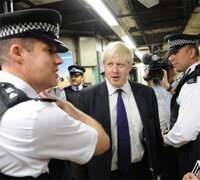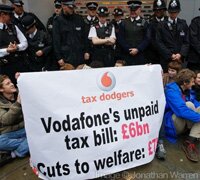DR Congo: what is to be done?
T LOOKS as if the world is watching the opening days of the third civil war to devastate the Democratic Republic of Congo in little more than a decade. And just as was the case on the previous two occasions, there do not seem to be any realistic resolutions on offer.
Situations of this complexity somehow seem to defy the capacity of the standard toolbox of concepts employed in international relations analysis. Simplistic socialist appeals to class politics and the organisations of the working class simply have no purchase on the realities on the ground in a part of the world where alignment largely flows from tribal identity. Trade unions and quasi-Maoist currents are known to have existed in the past, but as far as I am aware, do so no longer.
Even for those sections of the left that buy into the framework of humanitarian intervention – something that should surely be acceptable to socialists only in the most extreme circumstances – will be mindful that the DRC already hosts 17,000 UN troops, the largest such deployment anywhere in the world. Yet even two or three times that number of soldiers could not feasibly be expected meaningfully to maintain peace in a country the size of western Europe.
Perhaps the most practical immediate step would be for Britain – in its capacity as the main bilateral donor to neighbouring Rwanda – to make it plain to Kinshasa that its inflammatory if clandestine intervention in support of Rwandan business interests is not acceptable. Other countries with diplomatic leverage in the region should likewise warn off any other governments that might be considering entering the fray. However, what good such efforts will do is another matter.
Yet to spell out how we got to where we are now is considerably easier than coming up with any answers; while in normal circumstances it would be gratuitously offensive to compare a country with a woman who has been the victim of repeated brutal gang rapes, that seems to be about the only fitting simile for the experience of DRC since the Congress of Berlin.
Almost all African nations were, by the end of the nineteenth century, formally speaking colonies of one European power or another. But what was then known as the Congo Free State was unique in being the de jure personal fiefdom of Belgium’s King Leopold II, under whose reign over 10 million Congolese were to perish from disease and exploitation. So horrifying was his rule that international pressure forced the state of Belgium to regularise the situation in 1908.
Five years after independence in 1960 – which itself led to civil war with Belgian intervention to topple Moscow-aligned Patrice Lumumba – the country fell into the clutches of a man called Mobutu Sese Seko. As it turned out, he proved to be no run of the mill African dictator.
Sponsored by the US on account of his impeccable anti-communism, he proceeded to built a viciously repressive regime largely geared almost entirely to his personal enrichment. There have even been claims that the word ‘kleptocracy’ was coined expressly in his honour. By 1984, Mobutu was sitting on a $4bn fortune in his personal Swiss bank account, a huge sum at the time and an amount of the same order as the country’s national debt.
It took the civil war of 1996-97 to force him to flee the country. But peace was not established; in a spillover from the Rwanda genocide, a second outbreak of fighting soon sucked in half a dozen regional powers.
The main attraction was not ideological support for any of the contending forces, but rather the prospect of getting a slice of DRC’s vast natural resources, which include gold, diamonds, copper and coltan, a key raw material for mobile phones of the type you probably have sitting in your pocket. The result was a conflict that claimed 5.4m lives, making it the most bloody since the second world war.
History now looks set to repeat itself the first time as tragedy, the second time as tragedy and the third time live on CNN.
-------------------------
| Tweet |
Dave Osler is a regular contributor. He is a British journalist and author, ex-punk and ex-Trot. Also at: Dave's Part
· Other posts by Dave Osler
Filed under
Blog ,Foreign affairs
Sorry, the comment form is closed at this time.
You can read articles through the front page, via Twitter or RSS feed.
» What if Superdrug lived up to its name?
» Why we want to ‘recall’ Aaron Porter as NUS President
» Breakthrough in drugs debate as MPs call for full decriminalisation
» Report shows how the promise on NHS spending has been broken
» Why climate talks in Cancun failed miserably
» Why cuts to local councils will be much worse than Tories suggest
» Left unity and the bid to oust Aaron Porter
» The true horror of NHS privatisation is slowly coming out
» Why these protests are more dangerous than politicians realise
» How the police and then the BBC tried to humiliate Jody McIntyre
» Why local and national referendums are a really bad idea
|
13 Comments 42 Comments 39 Comments 33 Comments 19 Comments 33 Comments 34 Comments 71 Comments 146 Comments 200 Comments |
LATEST COMMENTS » rob chewit posted on More Vodafone and Topshop protests coming » rob chewit posted on How the police and then the BBC tried to humiliate Jody McIntyre » rob chewit posted on How the police and then the BBC tried to humiliate Jody McIntyre » Jenna Appleseed posted on How the police and then the BBC tried to humiliate Jody McIntyre » SSP Campsie posted on Why we want to ‘recall’ Aaron Porter as NUS President » Sunny Hundal posted on Left unity and the bid to oust Aaron Porter » Sunny Hundal posted on Why we want to ‘recall’ Aaron Porter as NUS President » Sunny Hundal posted on Why we want to ‘recall’ Aaron Porter as NUS President » Hamish posted on What if Superdrug lived up to its name? » Leon posted on Why we want to ‘recall’ Aaron Porter as NUS President » Vladimir posted on What if Superdrug lived up to its name? » Just Visiting posted on What if Superdrug lived up to its name? » Staffordshire UNISON posted on IFS: Child Poverty to rise due to Coalition plans » Staffordshire UNISON posted on More Vodafone and Topshop protests coming » Sunny Hundal posted on IFS: Child Poverty to rise due to Coalition plans |















